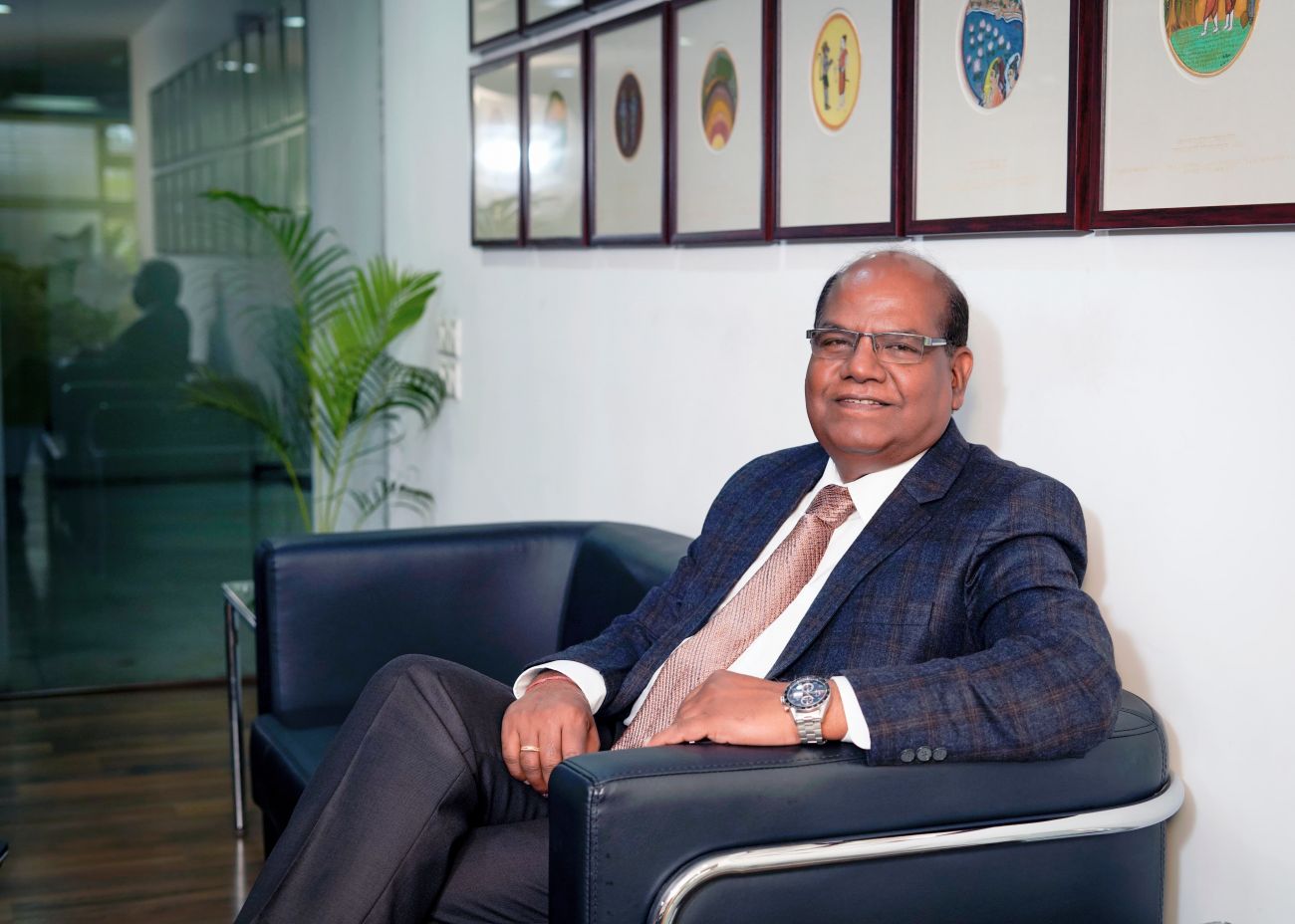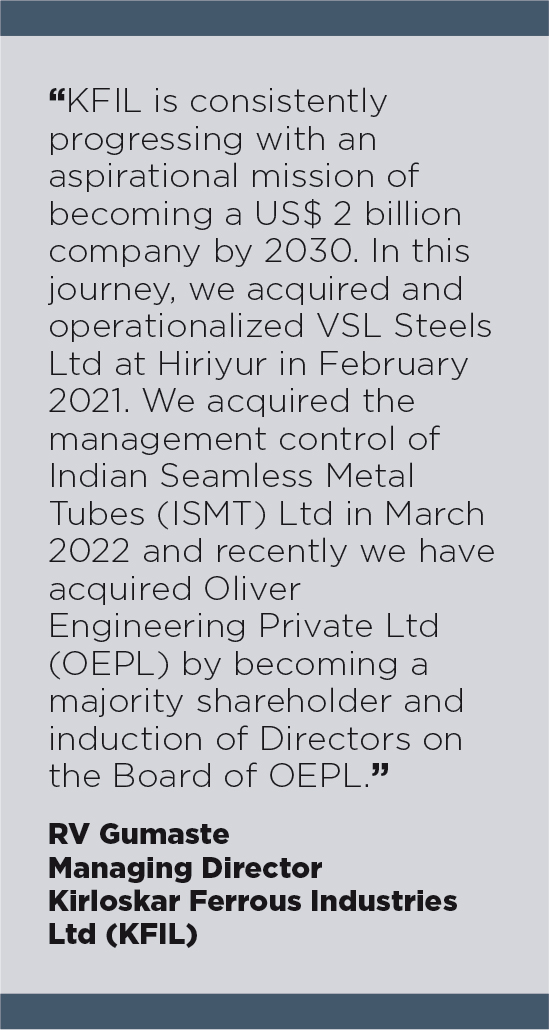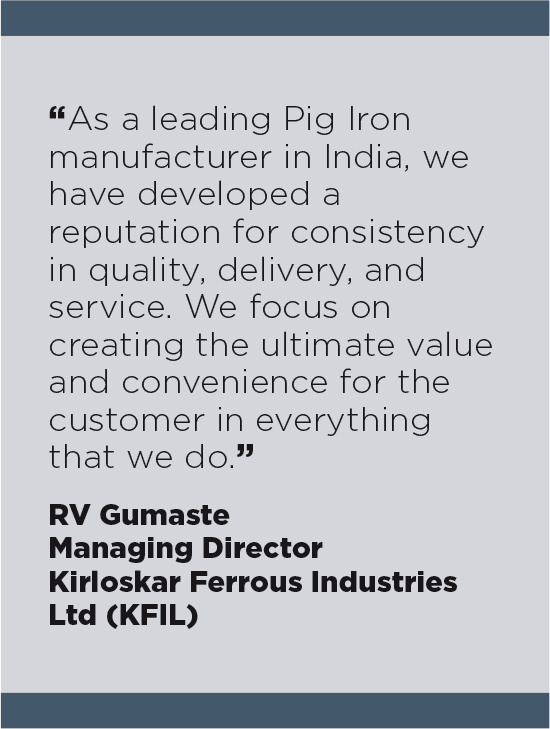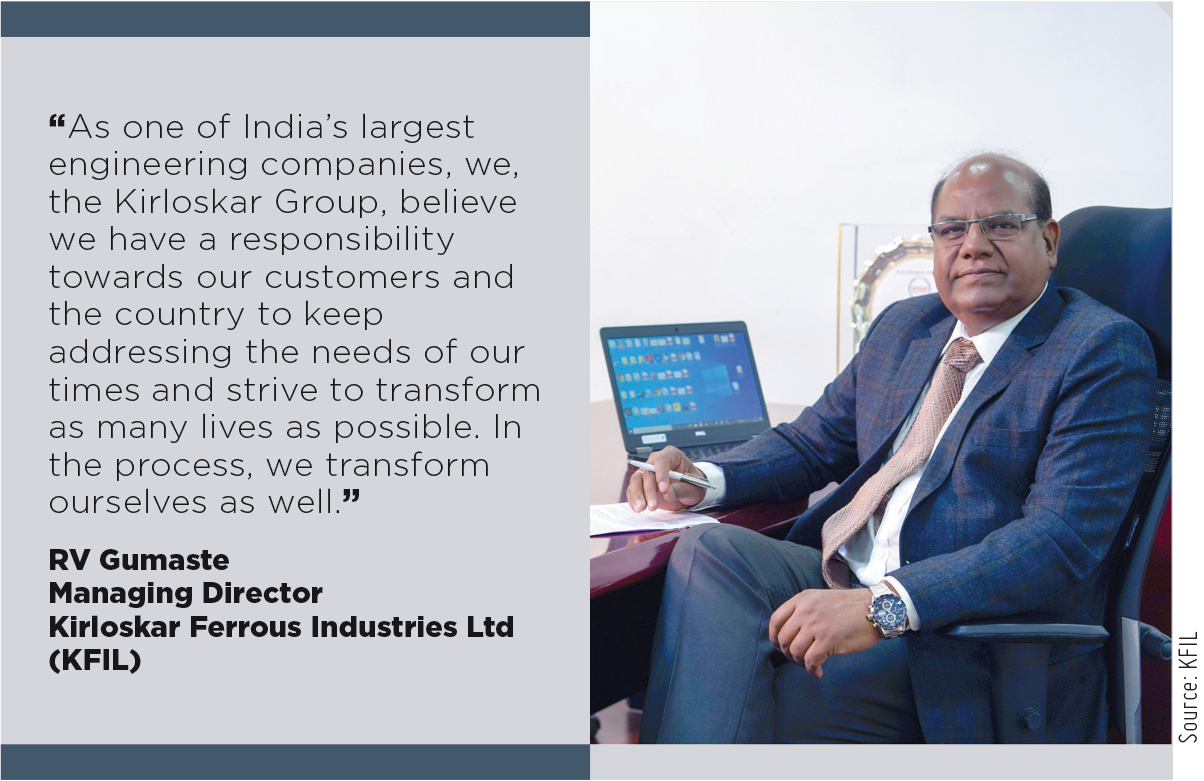BEING LIMITLESS

RV Gumaste, Managing Director, Kirloskar Ferrous Industries Ltd (KFIL), in the following interview with Soumi Mitra, Editor-in-Chief, MMI, offers an interesting insight into the company’s strengths, its position in the world market, future plans, and sustainability practices.
What is the significance of Kirloskar Ferrous Industries Ltd's (KFIL) parent company’s 130-year manufacturing and engineering legacy in shaping its approach to innovation and customer-centricity?
RV Gumaste: For over 135 years, we at the Kirloskar Group, affectionately referred to as Kirloskar, have focused on the progress of economic self-sufficiency and industrial growth in India. Our first products, the iron plough and chaff cutters, were introduced by our founder Hon. Late Shri Laxmanrao Kirloskar to encourage modernization in the Agricultural and Farming sector in the early 1900s.
Developed at a small-scale machine tool workshop behind a bicycle shop, the iron plough proved to be the first among many engineering innovations that the Kirloskar as a group would pioneer in the future.
Inspired by our founder’s vision and values, Kirloskar Group has built its foundation on strong business ethics, growth-driven innovation, quality products, and a commitment to corporate responsibility, ensuring the co-existence of industry and the environment. We have also consistently believed in adopting the latest technologies and embracing global cooperation, whether through joint ventures or technical collaborations, and being one of the first in India to do so.
Our in-depth understanding of the dynamics of industrialization and market requirements has greatly aided in expanding our global reach to over 70 countries.
As one of India’s largest engineering companies, we, the Kirloskar Group, believe we have a responsibility towards our customers and the country to keep addressing the needs of our times and strive to transform as many lives as possible. In the process, we transform ourselves as well.
Can you please elaborate on KFIL’s founding mission and where it has reached in its journey to transform the Pig Iron and Grey Iron Casting industry?
Grey Iron Casting industry?
RV Gumaste: KFIL is an acknowledged market leader in India for manufacturing and supplying complex and critical Grey Iron Castings and quality Pig Iron. KFIL, a part of the Kirloskar Group (K-Group) of companies, one of the leading engineering conglomerates in India, was founded by the late Laxmanrao Kirloskar in the year 1888. KFIL has been built on a solid foundation of innovation and customer-centricity. In 2021, Kirloskar refreshed its brand with a new vision of customer centricity that has translated into a brand platform ‘Limitless’. At Kirloskar, ‘Limitless’ is the ethos that defines how we operate – striving relentlessly to bring delight beyond boundaries to our customers.
Incorporated in 1991, KFIL commenced its operations in 1994. It is the only company in Asia that has integration from ‘Mines to Machined castings’. KFIL has manufacturing locations in Koppal and Hiriyur in Karnataka and Solapur in Maharashtra, and has three business verticals i.e. Pig Iron business, Casting business, and Seamless metal tubes.
Please apprise us of KFIL’s role in supplying castings and Pig Iron to the global Automotive industry, especially in terms of engine production.
The Indian Foundry industry puts the country on the map as one of the top 5 nations in the world making castings. KFIL has contributed more than a million tonnes of castings used for various applications, including a wide range of engines across construction machines, farm equipment, and utility vehicles engineered by some of the world’s largest automobile manufacturers.
The engine is the heart of any vehicle. KFIL supplies Cylinder Blocks and Cylinder Heads to some of the biggest players in the global and Indian Automobile industry. KFIL Pig Iron is used in making cast iron, which is the perfect input material for durable engines and other transmission parts. Our leadership team envisaged India’s upgradation from Euro 3 to Euro 6 vehicle emission standards and the constant change in the design of the vehicle and engine and, thereby, the change in the designs of casting as a continuous effort of new product development. With the same insight, we entered the industry with cylinder blocks and heads, tractor housing, and other solutions and moved closer to the raw material, the iron ore.
|
The India metal casting market size reached US$ 12,473 million in 2023. Looking forward, the market is expected to reach US$ 21,252 million by 2032, exhibiting a growth rate (CAGR) of 5.8 percent during 2024-2032. |
How does KFIL’s high-quality Pig Iron support the manufacturing of long-lasting machine tools?
KFIL’s Pig Iron Division is the largest producer of Pig Iron in India with a production capacity of 5 lakh tonne per annum. The Pig Iron Division started operations in 1994.
Pig Iron is an intermediate product and the first product of iron-making reduced from iron ore. It has a very high carbon content, typically 3.5–4.5 percent along with Silica, Manganese, Sulphur, Phosphorus, Titanium, and other trace elements.
Pig Iron comprises three main types basic grade Pig Iron, used mainly in electric arc steelmaking; foundry grade Pig Iron, used mainly in the manufacture of grey iron castings in cupola furnaces; and SG grade Pig Iron, used in the manufacture of ductile iron castings. Pig Iron is used for steel making, foundries, alloy making in automotive castings, and other iron-based castings.
As a leading Pig Iron manufacturer in India, we have developed a reputation for consistency in quality, delivery, and service. We focus on creating the ultimate value and convenience for the customer in everything that we do. This is the reason why each Pig Iron piece is designed to weigh 7-9 kg for easy use in all furnaces and cupolas. We meet customized Pig Iron requirements by undertaking special-grade production. Our SG (Spherodized Graphite) grade of Pig Iron is especially highly sought-after.
The delivery of our product is as important as its manufacturing. That’s why we fulfill customer requirements accurately with heat-wise stacking and loading of material. A key to this division is our emphasis on making the process of Pig Iron purchase more customer-friendly through enhanced delivery service, the best logistics network, and exclusive service providers.
|
KFIL leadership team envisaged India’s upgradation from Euro 3 to Euro 6 vehicle emission standards and the constant change in the design of the vehicle and engine and, thereby, the change in the designs of casting as a continuous effort of new product development. With the same insight, we entered the industry with cylinder blocks and heads, tractor housing, and other solutions and moved closer to the raw material, the iron ore. |
Kindly share your views on India’s position in the global Foundry and Automotive industries?
China has reported 54.05 million tonne of castings with 12.49 million tonne approximately. India is the second largest producer of castings. Nearly 5,000 foundries in India of which about 85 percent are small units, 10 percent are medium-sized and 5 percent are large, organized foundries. Of the bulk castings produced by Indian foundries, the largest chunk is that of grey cast iron, followed by ductile cast iron, steel, and non-ferrous alloys.
The India metal casting market size reached US$ 12,473 million in 2023. Looking forward, the market is expected to reach US$ 21,252 million by 2032, exhibiting a growth rate (CAGR) of 5.8 percent during 2024-2032. The global metal casting market size was estimated to be worth US$ 24,1460 million in 2022 and is forecast to a readjusted size of US$ 34,0580 million by 2028 with a CAGR of 5.9 percent during the review period.
21,252 million by 2032, exhibiting a growth rate (CAGR) of 5.8 percent during 2024-2032. The global metal casting market size was estimated to be worth US$ 24,1460 million in 2022 and is forecast to a readjusted size of US$ 34,0580 million by 2028 with a CAGR of 5.9 percent during the review period.
The global demand for castings has been on the rise in recent years. European countries and the US are gradually coming out of the economic slowdown, and are looking to outsource some of their castings manufacturing requirements. The Government of India is trying to propel the economic growth of the country by boosting exports. The new manufacturing policy envisages raising the share of manufacturing in the GDP to 25 percent. As foundry castings are an integral part of most engineering manufacturing processes, the role of Indian foundries is a very important part of this strategy. While India may be behind China as far as overall castings exports are concerned, it is the second-largest producer of castings globally. Understanding the need to be competitive, the Government of India is also modifying its policies so that the import of raw materials and export of castings is easier. This should boost casting exports from India.
India’s foundries are actively upgrading their facilities and technologies to enhance productivity and expand capacity, responding to escalating demand.
The Automotive sector is the main driver of foundries. About 60 percent of metal castings are for the Automotive sector, followed by Railways, Machine Tools, Defence, Aerospace, Sanitary Fittings, etc.
A decade ago, KFIL decided to shift from normal casting solutions to meet the requirements of international and MNC clients who were already working with the Euro 6. It was a challenging process as it required new technology, new processes, and improved competencies of the people in the manufacturing area. Today, the brand is internationally known for the Euro 6 large castings. Another hurdle that the KFIL team successfully surmounted was the high investment required for the technology. Despite the capital-intensive nature of the foundry, the decision to adopt a new technology was difficult to make as it required altering the process and the people’s skills and competencies.
Are there any initiatives or investments in the pipeline to adopt automation and advanced manufacturing techniques in the processes?
KFIL has undergone a significant transformation, with technology playing a crucial role as the brand upgraded its technology and embraced automation. As the industry transitions to Euro 6 standards, requiring thinner and more complex castings, and with auto parts being integrated into castings, we must increase our capacity and expertise in various casting technologies while maintaining a proactive mindset to adapt to these changes.
embraced automation. As the industry transitions to Euro 6 standards, requiring thinner and more complex castings, and with auto parts being integrated into castings, we must increase our capacity and expertise in various casting technologies while maintaining a proactive mindset to adapt to these changes.
We are working toward backward and forward integration. KFIL has recently set up a coke oven plant and power plant (waste heat recovery plant) at an investment of INR 600 crore. This initiative by the brand will lead to reduced importing of metallurgical coke as it will manufacture the coke.
Another positive step undertaken in the manufacturing process is the generation of 40 megawatt of power used in the foundry which eventually becomes a cost-reduction project for the brand. Apart from this backward integration, we have also embarked on forward integration by starting machine shops in Solapur and Koppal to offer machined castings to clients. The endeavor is to transition the raw material from iron ore mining to iron castings within 24 hours, a unique business model to set us apart from the rest.
|
The Automotive sector is the main driver of foundries. About 60 percent of metal castings are for the Automotive sector, followed by Railways, Machine Tools, Defence, Aerospace, Sanitary Fittings, etc. |
KFIL foundries are equipped to produce Grey Iron Castings weighing from 30 kg to 300 kg. These castings are used to manufacture heavy, medium and light commercial vehicles, SUVs, tractors, construction equipment, and industrial engines through a robotic core center.
In the Proto Casting business, to fulfill customer requirements for rapid prototype castings, KFIL has decided to reduce the new product development (NPD) time by setting up a 3D Core/Mold printing facility in the Koppal Plant.
Kindly highlight any sustainable practices or environmental efforts undertaken by KFIL in line with global trends.
Our sustainability framework is a set of principles and standards that are used to measure and manage our environmental, social, and governance (ESG) performance. Our environmental strategy focuses on continuously optimizing our existing processes and systems while also proactively implementing more efficient processes for new operations.
Some notable initiatives include:
The installation of the Blast Furnace Top Pressure Recovery Turbine (BLT) is expected to lower coke consumption by approximately 15 kg per tonne of hot metal (THM). This implementation offers a tangible benefit in terms of improved energy management within the system.
We have invested prudently in the adoption of renewable resources, primarily solar power generation, to promote green energy and reduce carbon footprint. We have installed a 10 MW solar plant and are planning for an additional 20 MW plant. Solar energy is a sustainable and clean source of power, enabling us to conserve energy and contribute to a greener future.
We have significantly improved energy management within the production process, reducing specific energy consumption. This achievement can be attributed to the installation of Variable Frequency Drives (VFDs) at power plants. We have also incorporated energy-efficient Low Tension (LT) motors, further bolstering our efforts to lower power consumption.
In addition to solar power, we also focus on waste heat recovery as an alternative to generating energy while minimizing our environmental impact. Our plant effectively captures waste heat from the coke oven and blast furnace processes. The waste heat, from the coke oven and blast furnace, is used to generate steam in our waste heat recovery boilers. The steam, in turn, drives turbines for power generation of 51.5 MW.
We have implemented several initiatives to mitigate air emissions. The efficiency of these initiatives is being assessed by the National Accreditation Board for Testing and Calibration Laboratories (NABL). Additionally, we have installed online environment monitoring stations for monitoring of Sulphur Oxide (SOx), Suspended Particulate Matter (SPM), Carbon Monoxide (CO) and Nitrogen Oxide (NOx) emissions to ensure that they are within the permissible limits. We have installed bag filters in our power plants to control emissions. These filters restrict the release of pollutants into the atmosphere, aligning with our commitment to responsible air emission management.
We have also undertaken tree plantation activities within plant premises in all three locations and its surrounding areas. This initiative aims to enhance green cover and shape a cleaner future.
We have taken well-thought-out measures to maintain air quality by implementing pollution control equipment at the necessary locations. This includes the installation of dust extraction systems and the use of porous mesh and tall plantations along our premise's perimeter to prevent the release of dust and noise outside our company grounds.
 |
SOUMI MITRA Editor-in-Chief |



 Facebook
Facebook.png) Twitter
Twitter Linkedin
Linkedin Subscribe
Subscribe